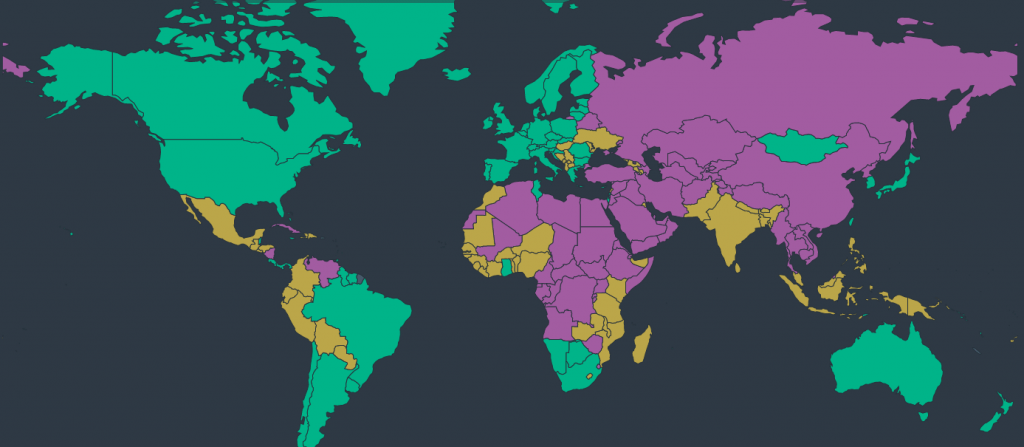Georgia experienced a one-point decrease in the Freedom in the World score, according to the new report by Freedom House, an international watchdog. In the 2021 ranking, Georgia garnered an aggregate score of 60 points (23 points in political rights and 37 points in civil liberties), continuing a modest decrease compared to last year’s result of 61 points. As in previous years, Georgia was classified among “partly free” nations.
According to the watchdog, Georgia’s “democratic trajectory showed signs of improvement during the period surrounding a change in government in 2012–13, but recent years have featured backsliding.”
It also highlighted that “oligarchic influence affects the country’s political affairs, policy decisions, and media environment, and the rule of law is undermined by politicization. Civil liberties are inconsistently protected.”
Political Rights
Assessing the October 31, 2020, parliamentary elections, the watchdog highlighted “significant shortcomings,” including “voter intimidation, misuse of administrative resources, vote-buying, election-related violence, and apparent tabulation discrepancies,” which led opposition parties to boycott the runoffs and the new Parliament.
The report said that Georgia’s electoral laws “are generally fair,” however, claimed that the ruling Georgian Dream (GD) party’s dominance at the precinct election commission level “complicated complaints procedures,” while the “short timelines for filing complaints impair election quality.”
According to the report, while it became easier for smaller parties to enter Parliament in 2020 due to the lowered threshold, “their fragmentation limits their ability to form coalitions and attain power.”
The Freedom House again designated Georgia as “a dynamic multiparty system,” where new political parties are often able to form and operate “without major obstacles.”
However, “a pattern of single-party dominance since the 2000s has inhibited the development and stability of competing groups.”
According to the Freedom House, Bidzina Ivanishvili, “who holds no government office but exerts significant influence over the executive and legislative decision-making,” diminishes elected officials’ ability “to determine and implement government policy.”
Moreover, the watchdog reckoned that “women and minority groups and their interests remain underrepresented at all levels of government,” despite the parliamentary gender quota introduced in June 2020.
Noting that the effective application of anti-corruption laws is “impaired by a lack of independence among law enforcement bodies and the judiciary,” the report underscored that “successful cases against high-ranking officials who are on good terms with the Georgian Dream leadership remain rare.”
In addition, the Freedom House mentioned a number of COVID-19-related public contracts issued in 2020 to businesspeople with links to the ruling party, including a contributor of President Zurabishvili’s campaign, who secured a USD 1.3 million deal with the Health Ministry, as well as several other tenders. The watchdog also said that “another party supporter secured a contract to produce four million face masks for a foundation controlled by Ivanishvili.”
Civil Liberties
The Freedom House described Georgia’s media environment as “pluralistic but partisan.”
The watchdog recalled the dismissal of several staff members from Adjara TV and Radio, a publicly funded regional outlet, between March and July 2020, after GD criticized the outlet’s editorial stance.
“At least some of the affected staff members were later reinstated after further protests,” Freedom House said.
The report underscored, that while the Georgian constitution guarantees religious freedom, it also “grants unique privileges to the Georgian Orthodox Church (GOC).” The watchdog noted that coronavirus-related gathering restrictions were not enforced on the GOC, while “many congregants reportedly did not attend church ceremonies.”
Noting that “Georgians generally enjoy freedom of expression,” the watchdog reiterated CSO groups’ concerns over various security-related laws empowering state agencies “to conduct surveillance and data collection without adequate oversight.”
Moreover, the report mentioned that both opposition and ruling party politicians “have been subjected to intimidation through the threatened or actual release of surreptitiously recorded sex videos,” deterring free expression in politics.
“Freedom of assembly is often respected,” the report said, albeit highlighted that “police sometimes respond to demonstrations with excessive force,” citing, among others, the use of water cannons against “largely peaceful demonstrators” outside the Central Election Commission headquarters following the parliamentary polls.
Regarding rule of law, the watchdog said “executive and legislative interference in the courts,” as well as “a lack of transparency and professionalism surrounding judicial proceedings,” remain as substantial issues, despite ongoing judicial reforms.
“A number of perceived opponents of the government have faced prosecutions in recent years that were widely seen as selective or politically motivated,” Freedom House added.
As for government-imposed coronavirus restrictions, the international watchdog said: “the constraints were largely proportionate to the public health threat.”
Georgia’s Russian-occupied Regions
According to the 2021 index, Abkhazia stands as a partly free territory, amassing 40 points, which is identical to last year’s result (17 points in political rights and 23 points in civil liberties). Tskhinvali Region/South Ossetia again received 10 points (2 points in political rights and 8 points in civil liberties), corresponding to the “not-free” category.
Also Read:
- Georgia in Freedom House’s Internet Freedom Report
- Georgia in Freedom House’s COVID-19 Report
- Detailed Freedom House ‘Nations in Transit’ Report on Georgia
This post is also available in: ქართული (Georgian) Русский (Russian)

